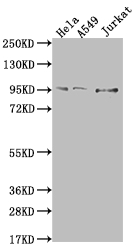To generate the CARS recombinant monoclonal antibody, CUSABIO first obtained the CARS monoclonal antibody. The immunogen used to produce the CARS monoclonal antibody is a synthesized peptide from the human CARS protein. The gene encoding the MAS1L monoclonal antibody is cloned and expressed, and the resulting product is purified using affinity chromatography to ensure high purity. The CARS recombinant monoclonal antibody has been extensively validated for its specificity and quality, and it can recognize and bind specifically to the human CARS protein. This antibody has been tested and proven to work well in ELISA and WB applications.
CARS is an enzyme that belongs to the class of ligases and specifically aminoacyl-tRNA synthetases. Its main function is to catalyze the attachment of cysteine to its corresponding tRNA molecule during protein synthesis. CARS plays an essential role in maintaining the accuracy and fidelity of protein synthesis by ensuring the correct amino acid is incorporated into the growing polypeptide chain. In addition to its primary function in protein synthesis, CARS has also been implicated in other cellular processes such as the regulation of cell growth and proliferation, signal transduction, and stress response.




